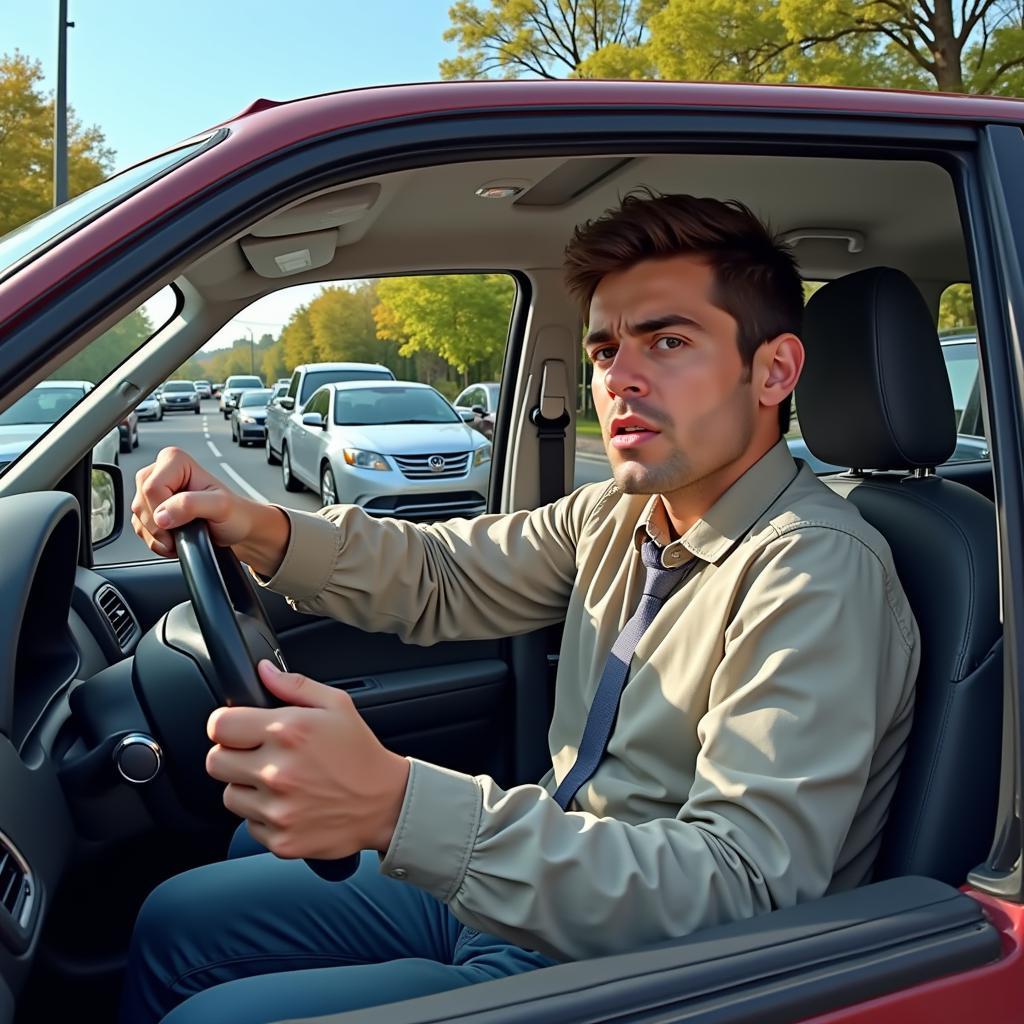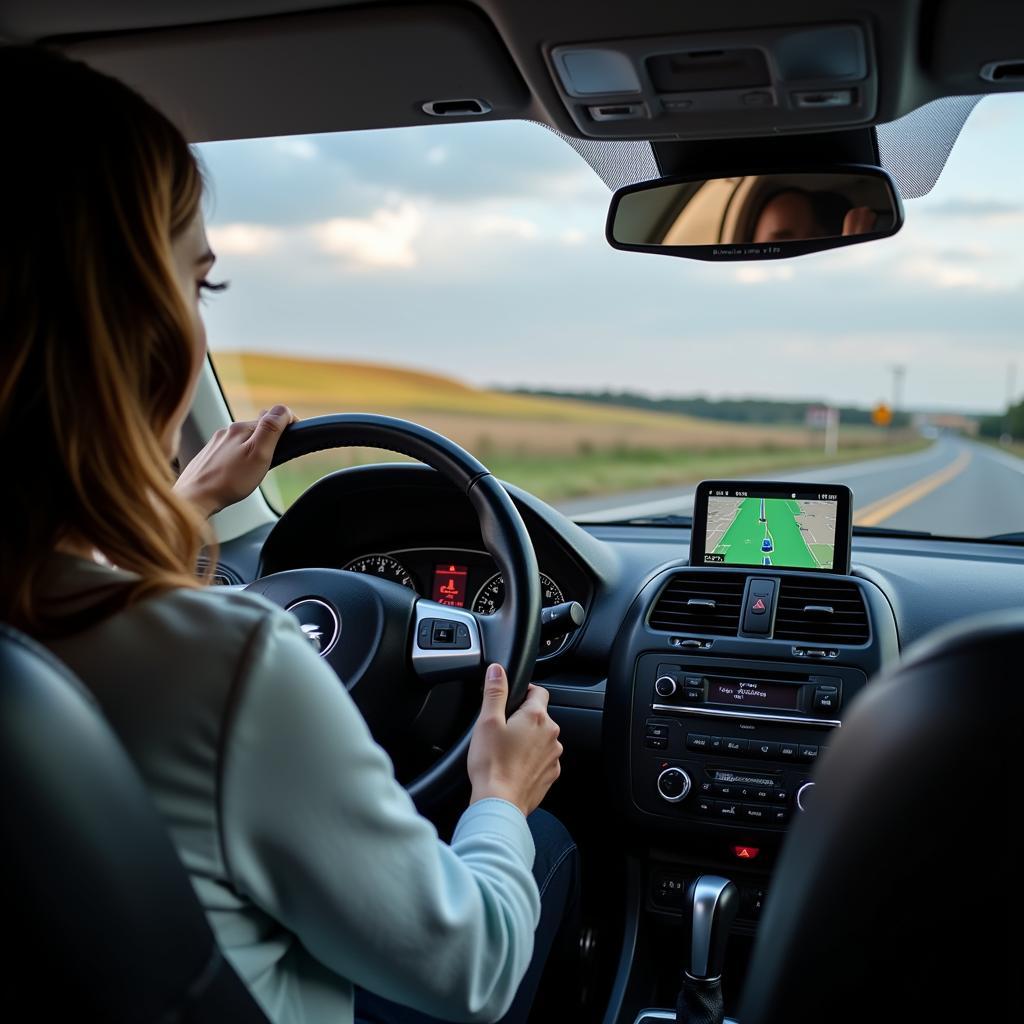Difficulty concentrating while driving can be a serious safety hazard. It can stem from various factors, from simple distractions like noisy passengers to more complex medical conditions. Understanding the “why” behind your concentration issues is the first step to safer driving.
Common Causes of Concentration Problems Behind the Wheel
Several factors can contribute to difficulty concentrating while driving. These can range from temporary distractions to ongoing medical concerns. Identifying the root cause is crucial for finding an effective solution.
Distracted Driving: The Modern Menace
In today’s connected world, distractions are everywhere, especially in our cars. Cell phones, GPS systems, and even in-car entertainment can divert our attention from the road. Texting while driving is particularly dangerous, as it requires visual, manual, and cognitive attention – all essential for safe driving. Even seemingly harmless activities like eating or adjusting the radio can take your focus away from driving, leading to potential accidents. Remember, a split second of inattention can have devastating consequences.
Fatigue and Drowsiness: Silent Killers on the Road
Driving while tired is akin to driving under the influence of alcohol. Fatigue slows reaction time, impairs judgment, and can even lead to microsleep, where you momentarily lose consciousness. If you’re feeling drowsy, pull over to a safe location and take a short nap. Caffeinated beverages can provide a temporary boost, but they’re not a substitute for proper rest.
Medical Conditions Affecting Concentration
Certain medical conditions, such as ADHD, anxiety, and sleep disorders, can significantly impact concentration levels. If you suspect a medical condition is contributing to your driving difficulties, consult with a healthcare professional. They can diagnose the issue and recommend appropriate treatment or management strategies. Don’t hesitate to seek help; your safety and the safety of others depend on it.
Stress and Emotional Distress: The Invisible Distractions
Stress, anxiety, and emotional turmoil can make it incredibly difficult to focus on the road. If you’re going through a challenging time, consider alternative transportation or postpone your trip until you’re in a better emotional state. Driving requires a clear head, and prioritizing your mental well-being is essential for safe driving. Remember, it’s okay to ask for help.
 Stressed driver stuck in traffic
Stressed driver stuck in traffic
How to Improve Concentration While Driving
Improving your focus behind the wheel requires conscious effort and consistent practice. Here are some helpful tips:
- Minimize distractions: Turn off your phone or put it on silent. Avoid eating, drinking, or adjusting the radio while driving.
- Get enough sleep: Aim for 7-8 hours of quality sleep each night. If you’re feeling tired, pull over and rest.
- Manage stress: Practice relaxation techniques such as deep breathing or meditation. Address underlying emotional issues with a therapist or counselor.
- Plan your route: Familiarize yourself with the route before you start driving. This reduces cognitive load and allows you to focus on the road.
- Take breaks: On long drives, stop every two hours to stretch your legs and refresh yourself.
- Consult a doctor: If you suspect a medical condition is affecting your concentration, seek professional medical advice.
“Proper sleep and stress management are crucial for maintaining focus while driving,” says Dr. Sarah Miller, a leading neuropsychologist specializing in cognitive function. “These factors can significantly impact reaction time and decision-making abilities.”
Why Problem with Concentration During Car Driving: A Recap
Understanding the causes of concentration problems while driving is essential for improving road safety. From distractions to medical conditions, various factors can contribute to this issue. By implementing the strategies outlined above and seeking professional help when necessary, you can significantly enhance your focus and become a safer driver.
Remember, driving is a privilege, not a right. Prioritizing your safety and the safety of others is paramount. If you are still facing concentration issues after trying these suggestions, connect with us at AutoTipPro for personalized assistance.
Phone: +1 (641) 206-8880
Office: 500 N St Mary’s St, San Antonio, TX 78205, United States
 Driver using GPS navigation system
Driver using GPS navigation system
“Driving requires unwavering attention. Even minor distractions can have major consequences,” adds automotive safety expert, John Davis. “By addressing the root causes of concentration problems, we can create a safer driving environment for everyone.”
FAQ
- What are the most common distractions while driving? Cell phones, GPS systems, in-car entertainment, and eating or drinking are among the most common distractions.
- How does fatigue affect driving? Fatigue slows reaction time, impairs judgment, and can lead to microsleep.
- What should I do if I feel drowsy while driving? Pull over to a safe location and take a short nap or drink a caffeinated beverage.
- Can medical conditions affect driving concentration? Yes, conditions like ADHD, anxiety, and sleep disorders can impact concentration.
- How can I manage stress while driving? Practice relaxation techniques and address underlying emotional issues.
- What should I do if I’m having persistent concentration problems while driving? Consult a doctor and consider seeking professional driving instruction.
- How can I minimize distractions while driving? Turn off your phone, avoid eating or drinking, and plan your route in advance.





Leave a Reply